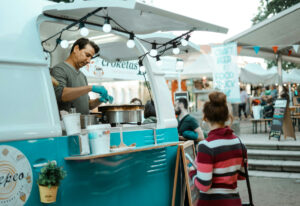 The culinary landscape is undergoing a remarkable transformation, with food trucks emerging as dynamic purveyors of delightful dishes that have captured the imaginations and palates of people around the world. This burgeoning industry has not only reshaped how we eat but has also provided a unique platform for chefs to showcase their culinary skills without the constraints of a traditional restaurant. Let’s explore the fascinating world of food trucks, tracing their evolution from humble beginnings to becoming beloved fixtures in cities worldwide.
The culinary landscape is undergoing a remarkable transformation, with food trucks emerging as dynamic purveyors of delightful dishes that have captured the imaginations and palates of people around the world. This burgeoning industry has not only reshaped how we eat but has also provided a unique platform for chefs to showcase their culinary skills without the constraints of a traditional restaurant. Let’s explore the fascinating world of food trucks, tracing their evolution from humble beginnings to becoming beloved fixtures in cities worldwide.Food trucks have a rich history, dating back to the late 17th century when they were known as “roach coaches” in the United States. These early food trucks provided a convenient and affordable way for workers to grab a quick bite to eat. However, it wasn’t until the late 2000s that food trucks experienced a renaissance, thanks in part to social media and the rise of foodie culture. Today, food trucks are celebrated for their innovative menus, creative concepts, and ability to bring gourmet cuisine to the streets.
One of the most appealing aspects of food trucks is their ability to offer a diverse range of culinary experiences. From gourmet burgers and artisanal pizzas to exotic fusion dishes and indulgent desserts, food trucks cater to a wide array of tastes and preferences. This diversity is further enhanced by the creativity and passion of the chefs behind the wheel, who often use locally sourced and seasonal ingredients to create their dishes.
Another key factor in the success of food trucks is their mobility. Unlike traditional restaurants, food trucks can move to different locations throughout the day, allowing them to reach a larger audience and adapt to changing demand. This flexibility also enables food trucks to participate in festivals, events, and markets, further increasing their visibility and popularity.
Furthermore, food trucks have played a significant role in revitalizing urban spaces and fostering a sense of community. By setting up in vacant lots, parking spaces, and public parks, food trucks have helped activate these areas, attracting people and creating vibrant gathering spots. Additionally, food trucks often collaborate with local businesses, artists, and musicians, further enriching the cultural fabric of a city.
In conclusion, food trucks have revolutionized the culinary landscape, offering a unique and exciting dining experience that celebrates creativity, diversity, and community. As these mobile kitchens continue to innovate and push the boundaries of culinary excellence, it’s clear that the food truck phenomenon is here to stay, delighting food lovers and transforming cities one delicious dish at a time.
